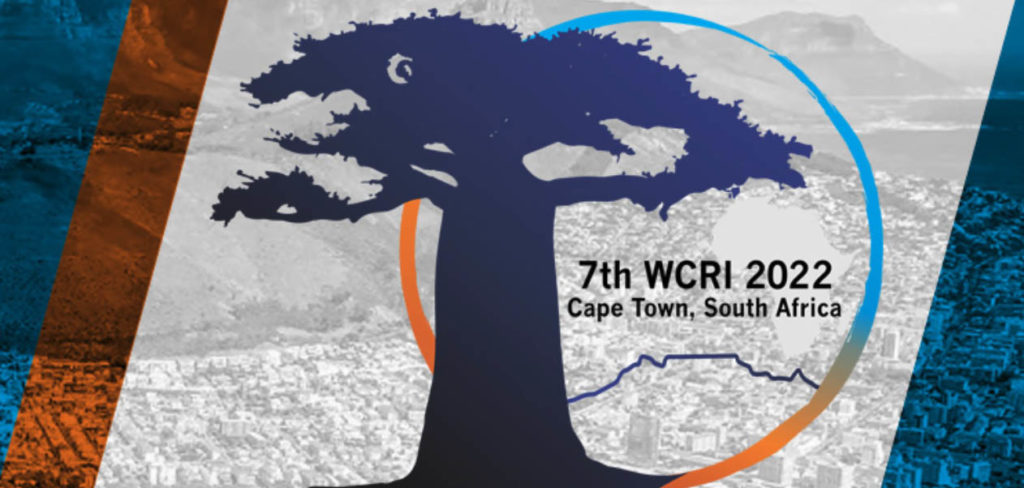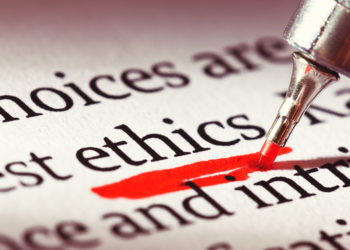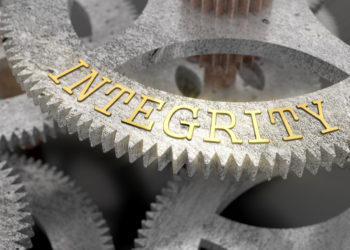Editor’s Note: Today’s post is by Natalie Simon, communications consultant specializing in higher education and research. Natalie is currently working with the University of Cape Town’s Office of Research Integrity to plan for and promote the upcoming 7th World Conference on Research Integrity
Trust lies at the very core of the global research endeavor. Researchers around the world need trust in order to build upon the work of others, rather than following false leads of unreliable studies. Society needs to trust scientists in order to benefit from the products of science — the anti-vaccine movement which puts all of society at risk for diseases which could otherwise be eradicated, is evidence of the dangers of a lack of trust by society in science. But researchers are human, and therefore fallible, vulnerable to error, conflicting interests, perverse incentives, and blind spots in the same way individuals in all other professions are. The discipline of research integrity is an attempt to build a universal culture of ethical and responsible research practices as well as systems within the overall research ecosystem for such a culture to flourish.

What is research integrity?
Research integrity is in essence about doing the right thing in a research context, but this is not as simple as it sounds. Research integrity is multi-layered and complex.
At the base level is the relatively straightforward issue of research misconduct, which is the fabrication, falsification, and plagiarism in proposing, performing, or reviewing research, or in reporting research results. Speaking at the 7th World Conference on Research Integrity virtual pre-event, Michael Kalichmann from the University of California San Diego pointed out that research misconduct can be boiled down to the global value that it is wrong to lie, cheat, or steal. In the same talk, however, he noted grave atrocities which occurred in the name of science in which no research misconduct in the strict sense was committed, notably experiments on humans undertaken by the Nazis in World War II and the Tuskegee study on men with syphilis in the United States in the 1930s.
These, he points out, are prime examples of researchers doing terrible things with no or ineffective resistance from the scientific community.
While these are extreme examples, the large majority of issues concern questionable research practices and the lack of responsible conduct of research.
According to Kalichmann the practice of knowing and intentional research misconduct, while it certainly does happen, is likely much less common than questionable research practices. All humans, he argues, are capable of acting unethically because of incentives, blind spots, and rationalizations. Human beings respond to incentives, and when we are rewarded for doing something morally dubious, we are very likely to follow through, and rationalize to ourselves that we are not really doing anything wrong. Kalichmann also spoke about blind spots in ethical behavior, that more often than not an individual faced with an ethical dilemma will not recognize it as an ethical dilemma and will fail to do the right thing. It is for this reason that institutions need to provide responsible research guidelines and training to ensure the highest possible ethical standards of their researchers.
Towards global consistency in research integrity
Research is a global endeavor, which means that so too should research integrity have some global consistency. For this reason, the World Conferences on Research Integrity (WCRI), established to “foster the exchange of information and discussion about responsible conduct of research” has developed several guiding documents:
The Singapore Statement of 2010 was the first international effort to unify policies, guidelines and codes of conduct to foster research integrity worldwide and is referenced in the large majority of later national codes of conduct on research integrity. The Singapore Statement rests on four key principles:
- Honesty in all aspects of research
- Accountability in the conduct of research
- Professional courtesy and fairness in working with others
- Good stewardship of research on behalf of others
The Singapore Statement also comprises fourteen responsibilities. The first eleven of those responsibilities address the behavior of individual researchers, but the final three responsibilities: responding to irresponsible research practices, research environments, and societal considerations address the role of institutions like universities in building and sustaining research integrity. And herein lies a third layer to the discipline of research integrity. Research does not take place in a vacuum, as researchers are, for the most part, housed within institutions with their own policies, remuneration incentives, and cultures; funders fund research which is accompanied by specific mandates dictating practice, governments legislate research practices and journals publish research. All of these role players can either encourage responsible research practices and research integrity or contribute to perverse or at least distracting incentives and push researchers towards questionable research practices for personal gain and career advancement.
Lining up research incentives with research integrity
In many cases, researchers are forced to make a decision between what is best for truth finding and research versus what is good for their careers, said Vrije Universiteit’s Lex Bouter, speaking about the Hong Kong Principles. These principles, developed at the June 2019 6th World Conference on Research Integrity in Hong Kong, are part of a broader effort in the research integrity community to push more responsibility on to institutions to ensure that their culture and practices are conducive to responsible research practices and to minimize perverse incentives.
The Hong Kong Principles have been developed as an alternative way to assess researchers for career advancement with a focus on behaviors that strengthen research integrity. As it stands, there is little emphasis placed on the rigor of research in decisions taken around career advancement. The principles are:
- Assess responsible research practices: this means to go beyond the practice of relying on bibliometric indicators as the primary factor in assessing research success. Here the San Francisco Declaration on Research Assessment (DORA) is very relevant as it is driving a global movement in research to improve the ways in the outputs of scholarly research are evaluated.
- Value complete reporting: it is well-known that failure to publish all findings of studies, including negative findings, distorts the evidence base for decision making.
- Reward the practice of open science: considering that most research is funded by public funds and the results of research have profound social impact, the outputs of that research should be accessible to all, not only those who can afford subscription fees. Further, the practice of making openly available all the steps of the research project lifecycle, including code written, data, workflows, etc., democratizes research, increases reproducibility, and avoids duplications of effort.
- Acknowledge a broad range of activities: different types of research should be incentivized, including the ‘less sexy’ reproducibility studies, developing software for research, and even different ways of conducting research.
- Recognize other tasks like peer review and mentoring: there is a need to move beyond narrow research assessments to consider other research activities essential for the research ecosystem to function optimally, including peer review and mentoring.
As part of the dissemination of the Hong Kong Principles, academic institutions, funders, other groups, and individuals are encouraged to endorse the principles. The 7th WCRI virtual event included two panel discussions on implementation of the Hong Kong Principles.
Building integrity in the international research ecosystem
Large international research collaborations are increasingly becoming the norm, which is a positive development in recognition that many perspectives are required to tackle the world’s grand challenge problems, such as those identified in the United Nations Sustainable Development Goals.
Speaking at the7th WCRI virtual event Jim Lavery from Emory University noted how these partnerships are highly susceptible to the influences of power and the conventions of established systems. These partnerships have revealed how power works in the research enterprise and increasingly, researchers from the global North and South are speaking out about unfair practices which manifest in these collaborations.
Now we see another layer which goes beyond individual and institutions and takes in the global picture. In response to this the 2013 3rd WCRI put out the Montreal Statement on Research Integrity in Cross-Boundary Research Collaborations. In its preamble the Montreal Statement reads:
Research collaborations that cross national, institutional, disciplinary and sector boundaries are important to the advancement of knowledge worldwide. Such collaborations present special challenges for the responsible conduct of research because they may involve substantial differences in regulatory and legal systems, organizational and funding structures, research cultures, and approaches to training.
The Montreal Statement says that, as well as adhering to the professionally responsibilities laid out in the Singapore Statement, researchers involved in cross-boundary collaborative research should also abide by 20 responsibilities laid out in the statement. These are categorized under four headings:
- General collaborative responsibilities: including integrity, trust purpose, and explicit goals.
- Responsibilities managing the collaboration: communication, agreements, compliance, distribution of costs and rewards, resource management, and effective monitoring of the project.
- Responsibilities in collaborative relationships: understanding of roles and responsibilities, understanding of customary practices and assumptions; conflict resolution mechanisms and strategies, and authority of representation of the collaboration.
- Responsibilities for outcomes of research: the sharing of data, intellectual property, and research records needs to be planned ahead of research, partners need to agree on how publication decisions will be made, as well as decisions around authorship and acknowledgement. Finally there needs to be agreement on how to respond to irresponsible research practices and all partners need to be accountable for their work and actions.
The Montreal Statement was a first step towards a more equitable and just global system, but arguably there is a much further distance to travel. There has been a recent groundswell of researchers, particularly in the global South, speaking out about how they find themselves relegated to a junior partner role in global research collaborations with partners in the global North.
Refiloe Masekela from the University of Kwazulu-Natal, speaking at the virtual event from the perspective of a researcher in Africa, argued that not only do we need to assist those researchers operating in a more disadvantaged setting, but also there must be a focus on addressing and removing those systematic barriers to build a more just research ecosystem.
The 7th World Conference on Research Integrity, due to take place in Cape Town, South Africa from 29 May to 1 June 2022 is the first WCRI to be held in the global South which makes it uniquely positioned to address this issue of how to build fair research collaborations in an unequal world. The Cape Town conference plans to put out its own Cape Town Statement to contribute the much-needed perspective of the global South to this important debate. The 7th WCRI will be a hybrid event that allows for on-site participation in Cape Town and on-line participation from elsewhere. Highly recommended for all who care about research integrity. Early bird registration deadline is 15 March 2022.


